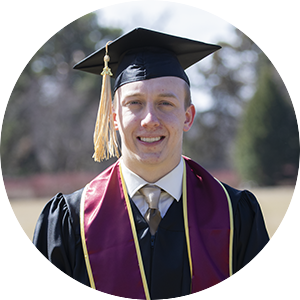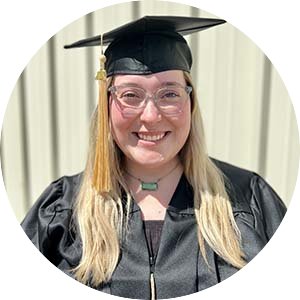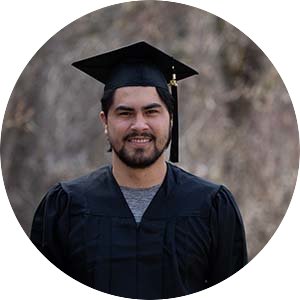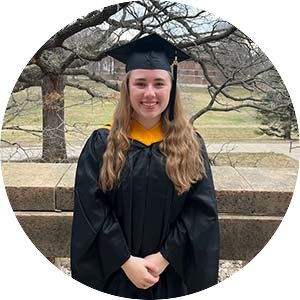
Celebrating our 2022 graduates
Every year, our CFANS community eagerly anticipates Commencement and the opportunity to congratulate and celebrate our graduates in a ceremony befitting such a momentous occasion. Here, we highlight the experiences that shaped two undergraduate and two graduate students who will be completing their degrees this month.
Undergraduate Students

Conner Holthaus
Major: Agricultural Communication and Marketing
Land-Grant Legacy Scholar
Tell us about your post-graduation plans.
"After graduation I will be working with Central Farm Service in Mapleton, Minnesota as a regional sales agronomist. This career ties into agricultural communication and marketing due to the intensive amount of communication that happens between growers and the salesman. If certain things are not communicated effectively, the grower could lose money."
What were some highlights of your CFANS experience?
"Being able to work with the livestock on this campus and working in the greenhouses truly provided me with a great hands on learning experience that I could not get elsewhere."
What advice would you give to students just starting out on their CFANS degree pathway?
"Get outside of your comfort zone and try to get an internship far from home."

Kristine Schechinger
Major: Agricultural Communication and Marketing
Land-Grant Legacy Scholar
Tell us about your post-graduation plans.
"After graduation, I plan on staying in Minnesota for the summer to complete my internship with Environmental Tillage Systems as their Marketing and Communications Intern. Come the fall of 2022, I will begin pursuing my master's degree in Agricultural Communications at Texas Tech University in Lubbock, Texas. I’m a firm believer in continuing your education; whatever that might look like for you. Completing a master’s will open many doors for me down the road and I’m looking forward to learning from professionals in the industry."
What about your CFANS experience helped to set you up for success?
"I think one of the strongest pieces of my CFANS experience is that I always had a dependable support system of faculty and advisors. Whenever I needed something regarding classes, future enrollments and more, they were always there. I was never alone and they always offered helpful advice."
What advice would you give to students just starting out on their CFANS degree pathway?
"My advice for students just starting out in their CFANS experience is to find your version of a community on campus and spend time dedicated to being involved with it. Being in college can be hard to manage, so picking a few clubs and organizations to be a part of makes it more worthwhile than spreading yourself too thin across multiple organizations."
Graduate Students

Joan Barreto Ortiz
Program: Applied Plant Sciences and Plant Breeding/Molecular Genetics
Master's student, Turfgrass Science Lab
Tell us about your post-graduation plans.
"After graduation, I will join the Plant Microbial Biology program at the University of Minnesota (UMN) as a PhD student. My research will focus on maize genomics and the use of multivariate methods to understand genetic and phenotypic variation. This builds upon my studies in CFANS, which focus on using multivariate approaches to understand the genetics of yield-related traits in perennial ryegrass. I am hoping to learn more about methods to improve grain quality in cereals and ways in which we could transfer knowledge and technology to vulnerable communities around the globe."
What about your CFANS experience helped to set you up for success?
"CFANS has provided a diverse environment with opportunities for personal and career development. I had access to a myriad of workshops and seminars that helped improve my academic and professional skills. Furthermore, I was granted funding opportunities to participate in national and international experiences that strengthened my scientific thinking. Moreover, interacting with a culturally diverse environment of students, faculty, and staff, not only gave me a holistic perspective of the world but allowed me to realize my role as a scientist and social responsibility."
What advice would you give to students just starting out on their CFANS degree pathway?
"There are many things I would like to say about this but I'll just share the two most valuable to me.
First, do not take anything for granted. We are among the shockingly small proportion of humans that have access to high quality education in a diverse environment. Take advantage and be thankful for every single opportunity, not only academic, but opportunities to learn from your mistakes, your life experiences, and those by others. Learn about the people around you, i.e. who they are, where they come from, and how much it took for them to get where they are. I strongly believe this would make you a more empathetic person and a more holistic professional. Much of the technical knowledge acquired during school is becoming available for free, but the opportunity to grow as a holistic professional and human being largely depends on what you learn from and your relationships with others. School not only provides topics to learn and earn a degree in, it provides a diverse environment where you can acquire both technical and social skills that can be applied beyond your professional life.
Second, think critically and keep an open mind. Do not be afraid to think differently and bring in new ideas. We live in a changing world where new knowledge and technology is complementing and/or refuting previous knowledge. I believe this is powered by new ideas, those that come from "thinking outside the box", and from questioning and reviewing our current knowledge. It is possible that the things we consider facts today will no longer be in the future. Even if you feel certain about your future career and life goals, be open to other opportunities that could grant more success and happiness as you go through your educational journey."

Anna Stockstad
Program: Natural Resource Science and Management
Master's student
Tell us about your post-graduation plans.
I will be working as a researcher in the UMN Department of Forest Resources on contract with the Minnesota Forest Resources Council. I’ll be involved in the revision of the Minnesota forest management guidelines, and in general will be working as a liaison between research and on-the-ground forest management. My master’s degree has focused on the effects of climate change on forest soils and timber harvesting, which are both major components of the Minnesota forest management guidelines. I’m excited to contribute my expertise in forest soils to this new role.
What were some highlights of your CFANS experience?
Of course my graduate school experience was different due to COVID, but I’ve been really lucky to have a strong group of friends in my cohort and we’ve been able to keep connected either virtually or in-person. Having a support network of fellow students really helped me through the toughest parts of grad school. Another favorite experience was taking Kyungsoo Yoo’s graduate soil formation and biogeochemistry course. We went on a field trip to the Landscape Arboretum and spent a beautiful fall morning learning about forest soils and their formation. It was my first in-person class after online learning, so I was so grateful to be back in the classroom! And during my time as an undergraduate student, I will always cherish my time at the Cloquet Forestry center during three forestry and wildlife field sessions.
What advice would you give to students just starting out on their CFANS degree pathway?
My biggest piece of advice would be to treat graduate school as a job. Prioritize creating a work-life balance and set boundaries with your work. You can’t be productive if you’re burnt out, so be consistent with taking time to yourself and doing the things that you enjoy outside of being a student. Maintaining your mental, emotional, and physical health is more important than graduate school.





